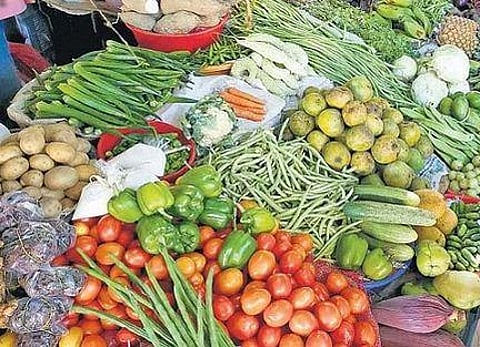

KOCHI: Are you of the belief that the organic fruits and vegetables you buy, often at a higher cost, are entirely free from safety concerns? It appears that you may be mistaken. As per the latest half-yearly research report from the Pesticide Residue Analysis Laboratory at Kerala Agriculture University, some organic vegetables and fruits sold in the market do, in fact, contain traces of pesticide residues.
These findings, based on research conducted as part of the ‘Safe to Eat’ programme, reveal that even vegetables and fruits sold in stores claiming to be organic show the presence of pesticides, including some that have been banned in the state since 2011. In the latest report from researchers covering the period between April 2023 and September 2023, the percentage of pesticides detected in vegetables and fruits obtained from open markets, direct from farmers, so-called organic shops, and eco-shops was 39.56 per cent, 15.15 per cent, 15.38 per cent, and 8 per cent, respectively. Of the 311 samples collected, 88 were found to have traces of pesticides, some of which are prohibited.
The report highlights that vegetables and fruits sold in the open market had the highest levels of pesticide residue. Various vegetables, including red and green amaranth, capsicum, celery, bajji chilly, beans, small brinjals, cabbage, chillies, coriander leaves, potatoes, breadfruit, apples, guavas, and mangoes, were among those found to contain pesticides. The report emphasises the importance of caution when consuming produce that may have pesticide residues, even in small amounts.
While it is expected that vegetables and fruits in the open market may have pesticide residue, the presence of these harmful chemicals in supposedly organic produce is particularly concerning. M M Abbas, director of Organic Kerala Charitable Trust, said many shops claiming to sell organic products may not actually source their produce from certified organic farmers and that it should be investigated. “The organic label has become a means of making money,” he added.
Abbas said that simply publishing the results is insufficient. “This has been ongoing since 2011. According to a guideline issued by the Union government, in addition to publishing the results, it is imperative to provide information about the measures taken to address the issue. Identifying the source of the produce with pesticide residues is also essential,” he said.
He said, “It should also be understood that individuals can only be held accountable when the pesticide levels exceed the established limits. However, even in cases where such violations have been identified, has any action been taken so far?” Another point he raised is that vegetables and fruits from organic farms may occasionally have minuscule traces of pesticides due to their use of water sources passing through other agricultural lands.